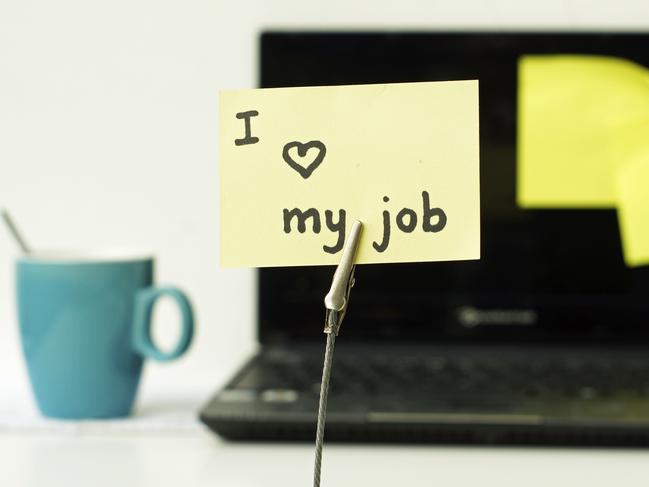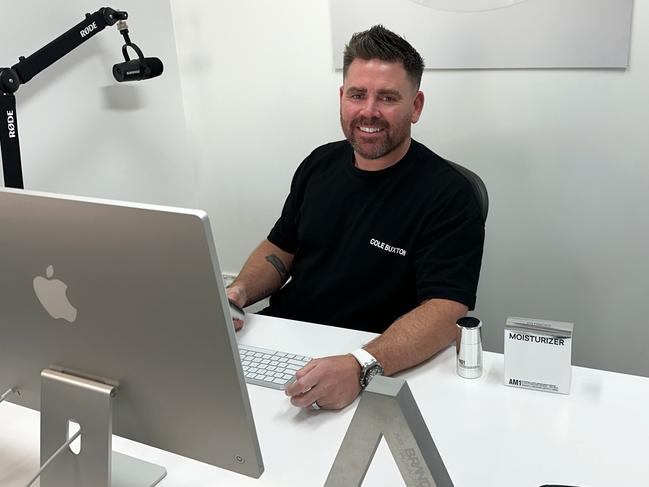‘Love versus money’: what should be the driving force when you choose a job?
Being happy at work is important, experts say, but most Aussies are too worried about financial pressures for this to be a priority. Here’s how to avoid sacrificing love for money.

Careers
Don't miss out on the headlines from Careers. Followed categories will be added to My News.
Australians are trapped in jobs that are making them miserable, as rising costs of living force workers to prioritise financial stability over career satisfaction.
Just a quarter of Australians love their job, while almost half only turn up to work out of obligation, research shows.
Experts say they understand the financial pressures, but urge dissatisfied workers to move towards a more fulfilling role or making their current position more enjoyable.
“Employees spend a third of their life at work … so being happy in a role should always be a top consideration,’’ says Kylie Green, APAC managing director at employee engagement platform Reward Gateway.
For love or money?
Just 27 per cent of Australians say they truly love their jobs, according to research from insurance comparison website Choosi.
In contrast, 49 per cent say their work is mostly, or entirely, out of obligation rather than enjoyment, and 74 per cent report being burnt out.
Similarly, Reward Gateway research finds many workers feel stuck in their jobs, with three-quarters of Australians only staying put until economic conditions improves.
Amid continuing talk of a recession, Green says workers have become unhappy job “stayers’’, prioritising employment security and income over pursuing their passions.
She encourages miserable workers to look for ways to increase job satisfaction, including through upskilling to make future career moves possible.
“People do talk about love versus money … as though it’s a zero-sum game,’’ Green says.
“(But) even if (workers) are staying in their current role right now, they can be developing the skills to contribute to their long-term success (and career satisfaction).’’

Getting it right the first time
Job satisfaction rates have plummeted across the entire workforce, from newly-employed graduates to senior executives, career coach Leah Lambart says.
The founder of Relaunch Me says while many stay in existing employment to avoid the drop in salary that a more appealing role might bring, others simply cannot afford to retrain for the job of their dreams.
“It really depends on their situation and whether they have someone else that can provide financial support (while they are retraining or transitioning to a new role),’’ Lambart says.
“If there’s study involved, then obviously that’s a really big financial hurdle. You really want to get it right the first time rather than be doing multiple courses and degrees.’’
Lambart says those contemplating study should speak to others who have undertaken the same course to find out whether the job outcomes are what they are looking for.
Those with financial obligations that prevent them seeking another role should craft their current position into one that better aligns with their passions and strengths, she says.
“For instance, if you love writing but you don’t get to do that in your current role, look for opportunities to get involved in other projects where you can do some writing and perhaps delegate or reduce some of the things you don’t like,’’ Lambart says.

‘Praying for Monday’
Patrick Kidd was an electrician for 11 years, including three years in the UK earning “10 grand a week with the (then) exchange rate, doing relatively easy work’’.
But he hated the trade and, after waking one morning in tears at the prospect of going to work, decided to open a luxury men’s hair salon in Bondi.
Noticing a lack of mens’ hair-care products, Kidd soon launched his own brand, with his reinvigorated passion for work seeing him pitch the Patricks hair care line to top UK and US retailers.
His male grooming line is now worth more than $50m and Kidd says going to work each day is a joy.
“You get to Friday and people say, ‘Thank God, it’s Friday’, but I’m praying for Monday. I just love it (work),’’ Kidd says.
“I tell people – roll the dice and start doing the thing you want to do.
“Worst case is you completely mess it up and you go back to the job you were doing before.’’
Small steps
Not everyone can afford to quit their job immediately, life coach Rena Harvey says. But they can take steps towards their dream career.
“Spend 10 to 30 minutes a day concentrating on how you are going to (transition to a new job) and just start moving,’’ says Harvey, the author of The Formula of Life.
“Talk to people – maybe you want to be a doctor and you can’t afford (a medical degree) but then you hear there’s a scholarship you could apply for.
“Have faith and trust. Don’t give in to limiting beliefs. You don’t have to quit your job yet – just take small steps.’’
The sad state of Australia’s workforce
• Only 27 per cent of Australians truly love what they do for work
• 49 per cent feel like their study or work is mostly or all out of obligation rather than enjoyment
• 74 per cent say they will leave their jobs when the economic climate improves
• 27 per cent feel less engaged at work than they did a year ago
Sources: Choosi and Reward Gateway
Originally published as ‘Love versus money’: what should be the driving force when you choose a job?


